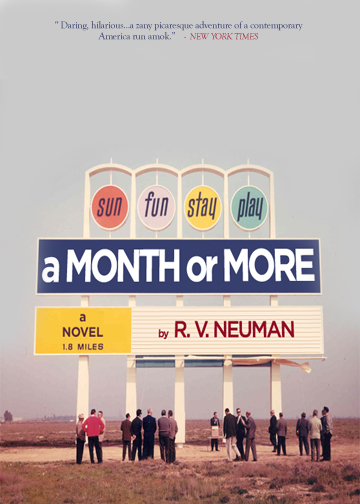
R. V. Neuman's A Month Or More
by Will Hubbard
I am sitting in Gucci, a Midtown barbershop named not for the Florentine fashion icon but for Maritzio Gucci, the shop's septuagenarian proprietor and sole stylist. Gucci is roughly 12'x12' and boasts the striated green marble and mirroring of a men's restroom in an opulent hotel. But Mr. Gucci, for all the glitz of our surroundings, is warm and gregarious, speaking to me of his notable clientele with the visibly conflicted pride of a child showing a perfect test score to his less fortunate classmates.
I am not here for a haircut. Instead, Mr. Gucci's shop is simply the most recent attraction on my week-long whirlwind tour of the haunts and habits of novelist Robert Vernon Niman, or "R. V. Neuman" as it appears on the spines and dust jackets of his books. His latest, A Month Or More, is slated to appear in early 2009 and will, if we can believe the author's cryptic musing from Mr. Gucci's chair, "draw out something from the blood of this country that none knew existed before, either in violence or in love."
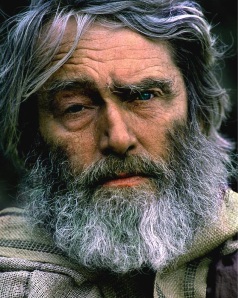
the author in Peru, circa 2003 (photo: Langdon Mackerley)
Niman is not an easy man to track down, and at 6 feet 7 inches tall, with deep emerald eyes and jacknifing black eyebrows crowned with grey, he is an even harder man with which to talk. Most days I have found him outfitted in a simple white polo, tartan wool slacks, and either a camel-hair or navy blazer depending on the ferocity of the early autumn chill. His cordovan loafers shine in even the lowest lights - "a man should wear cordovan, period" - and I cannot help but feel like his bumbling apprentice as I'm tugged into one Old Manhattan bistro after another.
But for all Niman's warnings, A Month is not much of a departure in content or style from his previous efforts. The setting - as in 1994's witty if oblique Honey, and 2003's Stones In The Cellar - is blue-collar, south-east Bakersfield, California, the gritty neighborhood of the author's birth and upbringing. The sentences are long but crystalline, beguiling as they are unaffected. One slips into the gnostic dream of Niman's world as though the way has been lubricated: initial violence gives way to a resigned and fluid motion forward and down. "Your first fifty pages are like birthing a child, but after that, absolute bliss!," Niman squawks in the high, mildly Southern and distinctly mocking tone of voice he often uses to parody his readers.
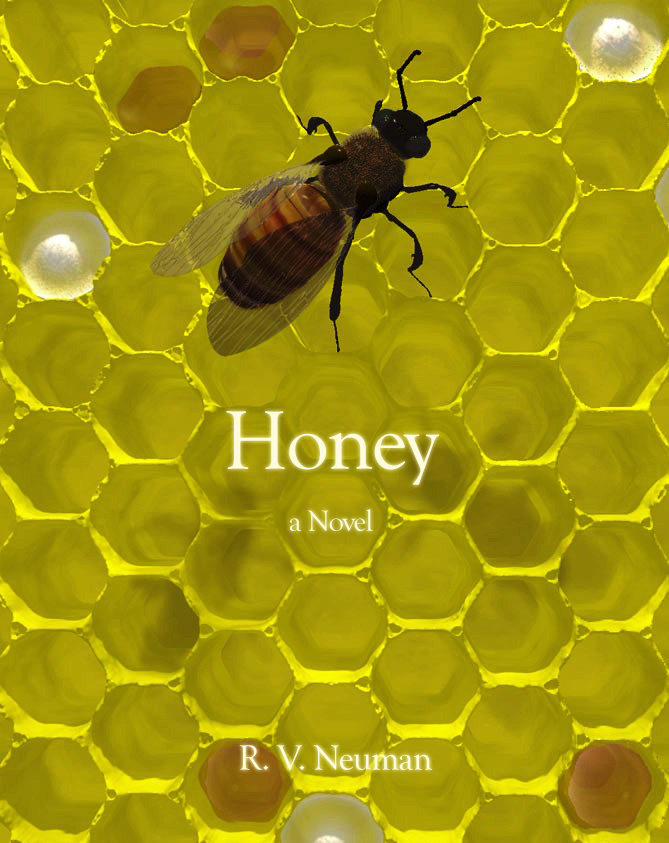
Mr. Gucci trims Niman's paltry tuft of bang with a surgical exactitude, the last step of what has revealed itself to be a rather laborious and intricate haircut. To me, the author looks more or less exactly as he looked before - vaguely aristocratic, detached but in control, intimidating as a lion. He has never married ("or divorced!"), and has lived the last two decades since returning from a twelve-year, meandering tour of the continent of Asia in a small but comfortable studio apartment two and a half blocks off Central Park West. He enjoys neither walking in the park nor going to the cinema, preferring to spend time between writing bouts aboard his tiny motorboat - named for his first novel, Nowhy To Run - on the Hudson. "The fishing was better when the river was a dump; now I mostly make large, irregular figure eights and wait for the sun to go down behind New Jersey."
For the most part, Niman refuses to talk about his childhood in Bakersfield. His mother Cindy ran a business that supplied temporary catering staff to events in wealthy people's backyards; the author's one (and by his own reckoning poorly-researched) biography casts his mother as strong-willed but lacking imagination, pushing her son toward a career in the forest service rather than encouraging his obvious literary talents.
Nothing is known about Niman's father, and when in 1995 an interviewer pestered him about the subject, Niman famously smashed his tumble of white-wine and Fresca (still his preferred drink) and began whispering a string of skittering negations - "Never... Not... Nil... Nohow... Non..." - that would obsess and frustrate critics for years to come.
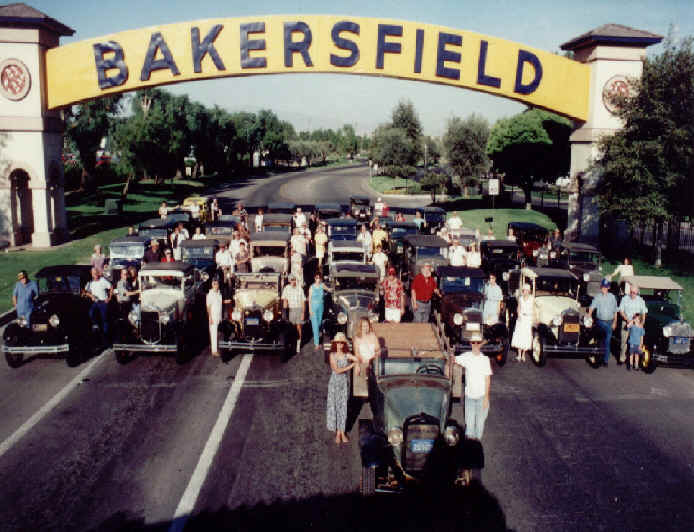
Bakersfield Model-A Club
Not wanting to add to the myth, I have skated the subject all week hoping for a voluntary offering. I am particularly interested in the possible relation of Niman's father and A Month's fiery, winsome, and somehow blandly Protean protagonist, Marcellus, a paterfamilias a la Faulkner's Sutpen faced with the task of retrieving his family's good name after a spate of suicides, a child conceived by first cousins, and a massive wildfire that has completely destroyed the natural habitat of the winger-wasling, a virtually extinct and fantastically beautiful species of bird that drew, owing greatly to the oral lore of the wizened inhabitants of a nearby Native American reservation, the meager but steady tourism that kept his beloved city afloat.
Ironically, it is Mr. Gucci that provides my entrée into the subject of Niman's father. He asks him while lathering his lightly-stubbled face for a shave, "This is one of the thickest beards I've ever seen. Signor, your father had a great beard too, yes?"
Niman, eyes closed and head tilted back, does not stir; has he heard the barber at all? For a long moment I am tense, wondering whether to build on Mr. Gucci's ignorance in hopes unravelling the enigma of the novelist's early days in Bakersfield. Just maybe, more than ten years after the tumbler and whispering incident, Niman is ready to talk.
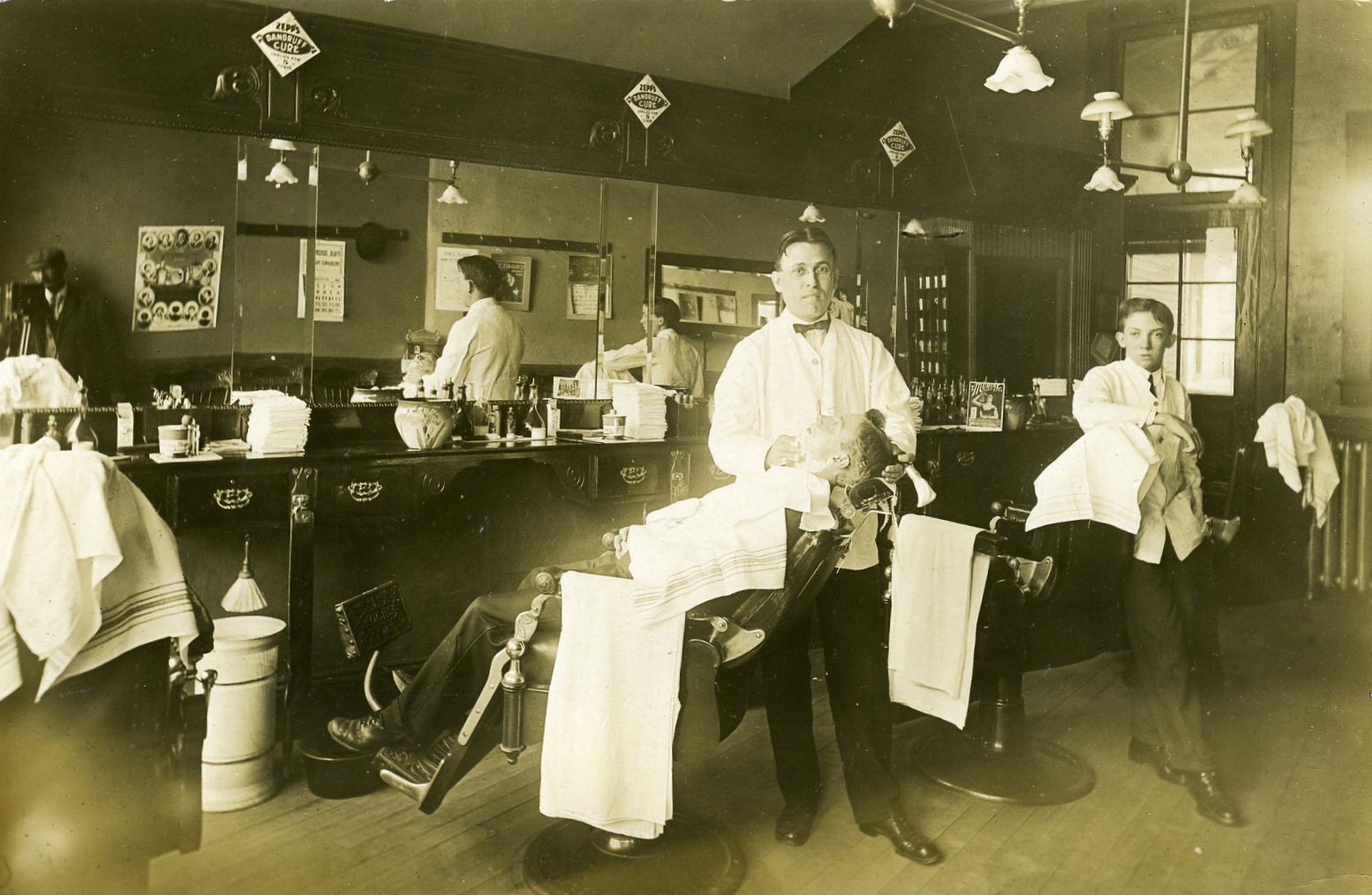
And he does: "Turn to the middle section...Must be around page two-thirty or two-thirty-five....The paragraph begins 'All of us waited in the kitchen' or something like that." I understand that he wants me to open my advance copy of A Month or More and read the passage aloud. I am wary of what is in store for Gucci and I, but excited to be reading to a great writer from what may well be his masterwork. I begin:
All of us waited in the kitchen, some under the table and some over near the pantry, while Marcellus bundled the remaining sacks and dragged them to the curb. The light fell out of the one grimy window above the sink, and by the time his first tired footstep fell on the stairs leading up to the porch, the house was a dark, deep blue. Though I cannot speak for the others, the sound of Marcellus' boots on the dry wood and the creak of the screen door as he pulled it slowly open were not regular sounds, like a cat or a pot of tea might make. It was as if Marcellus were walking in my mind and not through the world, as though the sound of him were nothing but the sound of my own thoughts runnin' into one another. And when he joined the others under the table I knew it had always been, and would always be that way.

"Serpentine Drive", the old way from Los Angeles to Bakersfield
I look to Mr. Gucci, who has stopped shaving the author somewhere during my monologue. The old man is looking down at the half-lathered face, rapt in a limp but enveloping admiration he doesn't quite seem to understand. Niman himself says nothing.
Recalling our first moments in the shop, I ask whether the passage, or the book as a whole, deals primarily with violence or primarily with love. Mr. Gucci is just finishing with the blade, and begins to towel off the writer's face, which to me looks exactly as it did before. Looking up at Gucci, then at me, his mouth forms a smile at first sarcastic but melting as a moment passes into one of genuine pleasure. He chuckles as he rises to his feet, and looking into the mirror to inspect the job, says, "Violence or love? That I can't answer. Because thankfully, finally, I cannot tell them apart."
Will Hubbard is a writer living in New York City. He can be reached at whubbard at gmail dot com.
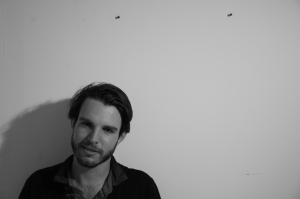
portrait of the author as a young man
"96 Tears" - ? & The Mysterians (mp3)
"New Partner" (Will Oldham Cover) - Mark Kozelek (mp3)
"Light's Out" (Diplo Panda Bear Mix) - Santogold (mp3)
"Son of a Preacher Man" - Dusty Springfield (mp3)
PREVIOUSLY ON THIS RECORDING
Will finds Pavese in Pete and Kate.
Alex glorifies suicide in a good way.
Molly pretends to pretend to lament Baudrillard's passing.